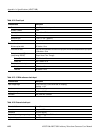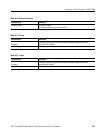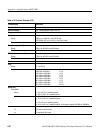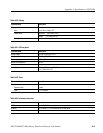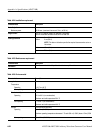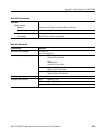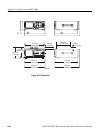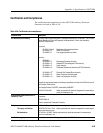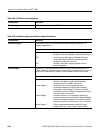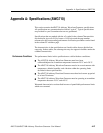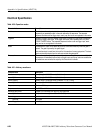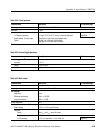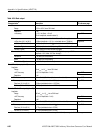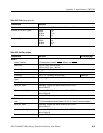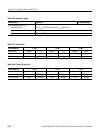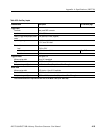
Appendix A: Specifications (AWG710B)
A-26 AWG710&AWG710B Arbitrary Waveform Generator User Manual
Pollution degree
Pollution Degree 2 (as defined in IEC 61010–1)
6
Up to 200 mV
p–p
noise is allowed on the output during this test.
Table A-28: Certifications and compliances
Characteristics Description
Table A-29: Installation category and Pollution degree Descriptions
Characteristics Description
Installation category
Terminals on this product may have different installation category designations. The
installation categories are:
Category Descriptions
CAT IIIe Distribution–level mains (usually permanently connected).
Equipment at this level is typically in a fixed industrial location
CAT II Local–level mains (wall sockets). Equipment at this level
includes appliances, portable tools, and similar products.
Equipment is usually cord–connected
CAT I Secondary (signal level) or battery operated circuits of
electronic equipment
Pollution degree
A measure of the contaminates that could occur in the environment around and within a
product. Typically the internal environment inside a product is considered to be the same as
the external. Products should be used only in the environment for which they are rated.
Category Descriptions
Pollution Degree 1 No pollution or only dry, nonconductive pollution occurs.
Products in this category are generally encapsulated,
hermetically sealed, or located in clean rooms.
Pollution Degree 2 Normally only dry, nonconductive pollution occurs.
Occasionally a temporary conductivity that is caused by
condensation must be expected. This location is a typical
office/home environment. Temporary condensation occurs only
when the product is out of service.
Pollution Degree 3 Conductive pollution, or dry, nonconductive pollution that
becomes conductive due to condensation. These are sheltered
locations where neither temperature nor humidity is controlled.
The area is protected from direct sunshine, rain, or direct wind.
Pollution Degree 4 Pollution that generates persistent conductivity through
conductive dust, rain, or snow. Typical outdoor locations.



